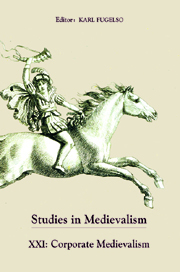Book contents
- Frontmatter
- Acknowledgments
- Contents
- Title in the Series
- Editorial Note
- I Corporate Medievalism: Some Perspective(s)
- Lives of Total Dedication? Medieval and Modern Corporate Identity
- Reincorporating the Medieval: Morality, Chivalry, and Honor in Post-Financial-Meltdown Corporate Revisionism
- Medievalism and Representations of Corporate Identity
- Knights of the Ownership Society: Economic Inequality and Medievalist Film
- A Corporate Neo-Beowulf: Ready or Not, Here We Come
- Unsettled Accounts: Corporate Culture and George R. R. Martin's Fetish Medievalism
- II Interpretations
- III Response
- Notes on Contributors
- Title in the Series
Reincorporating the Medieval: Morality, Chivalry, and Honor in Post-Financial-Meltdown Corporate Revisionism
from I - Corporate Medievalism: Some Perspective(s)
Published online by Cambridge University Press: 05 February 2013
- Frontmatter
- Acknowledgments
- Contents
- Title in the Series
- Editorial Note
- I Corporate Medievalism: Some Perspective(s)
- Lives of Total Dedication? Medieval and Modern Corporate Identity
- Reincorporating the Medieval: Morality, Chivalry, and Honor in Post-Financial-Meltdown Corporate Revisionism
- Medievalism and Representations of Corporate Identity
- Knights of the Ownership Society: Economic Inequality and Medievalist Film
- A Corporate Neo-Beowulf: Ready or Not, Here We Come
- Unsettled Accounts: Corporate Culture and George R. R. Martin's Fetish Medievalism
- II Interpretations
- III Response
- Notes on Contributors
- Title in the Series
Summary
Those who follow such things will have undoubtedly noticed that the Capital One “What's in your Wallet” Viking commercials have undergone a dramatic change since they originally aired. Early versions of the commercials cast the Vikings as a collective, agonistic, and decidedly pre-modern other. Garbed in pelts, wearing horned helmets, and wielding all manner of medieval weaponry, they waited in hordes just beyond the horizon, ready to charge screaming into the fray and ruthlessly visit any unfortunate credit-card purchase with requisite and over-determined medieval violence – that is, any credit-card purchase that was not made from beyond the silvered shield-wall of a Capital One credit card. In more recent commercials, however, the Vikings have acquired a decidedly more domestic mien. Though neither their garb nor their weaponry has changed, they have nevertheless forsworn raiding in favor of more mundane and innocuous pursuits such as babysitting, playing in rock bands, and serving as flight attendants, shoe salesmen, and electricians. The Vikings, as such, have become apt spokesmen for the corporation that once thwarted them at every turn and, arguably, for all of the major banks (including Capital One) whose lending policies were responsible for the global financial crisis of 2007 and 2008. Heavy-handed brutes who cause chaos and destruction at every turn, they are portrayed as well-intentioned and likeable and, if the scenarios featured in the most recent commercials are any indication, well on their way to becoming productive members of society.
- Type
- Chapter
- Information
- Studies in Medievalism XXICorporate Medievalism, pp. 11 - 26Publisher: Boydell & BrewerPrint publication year: 2012



